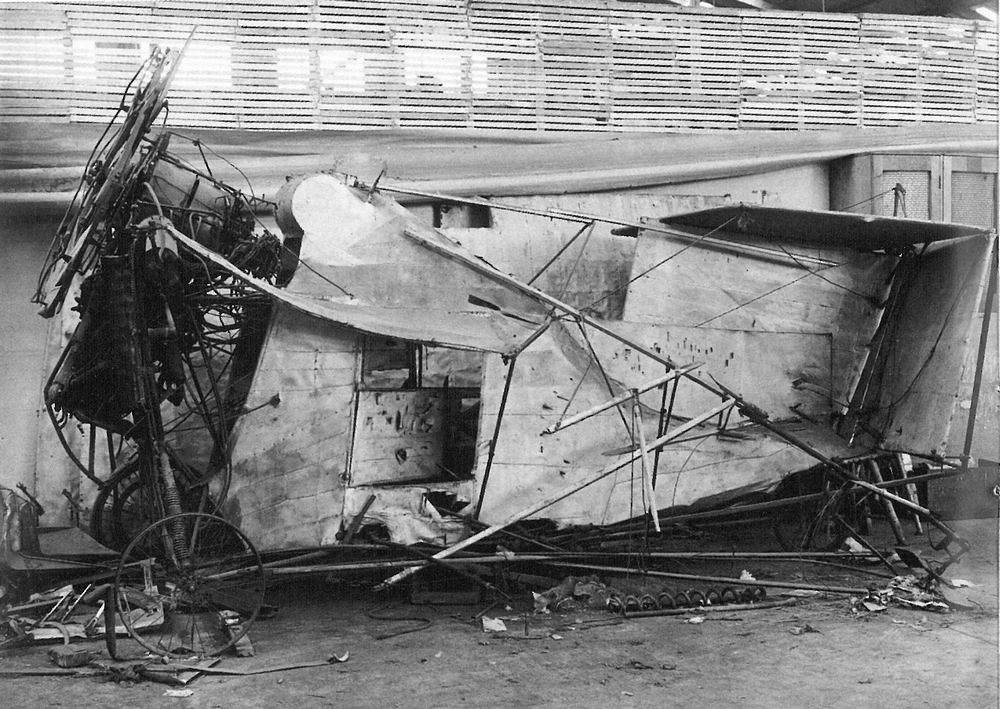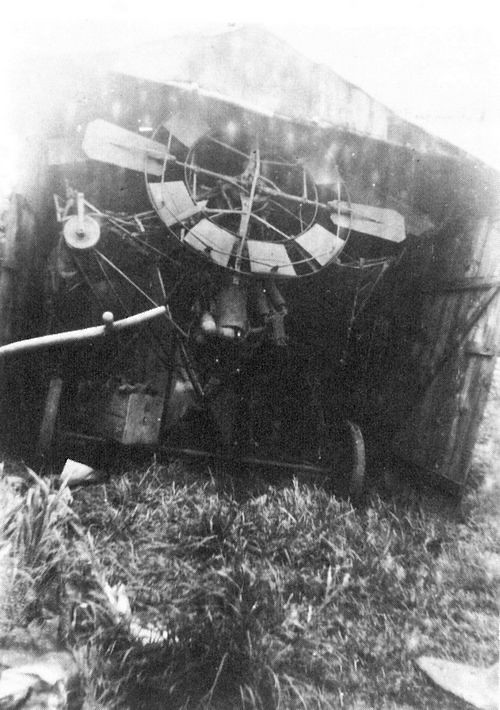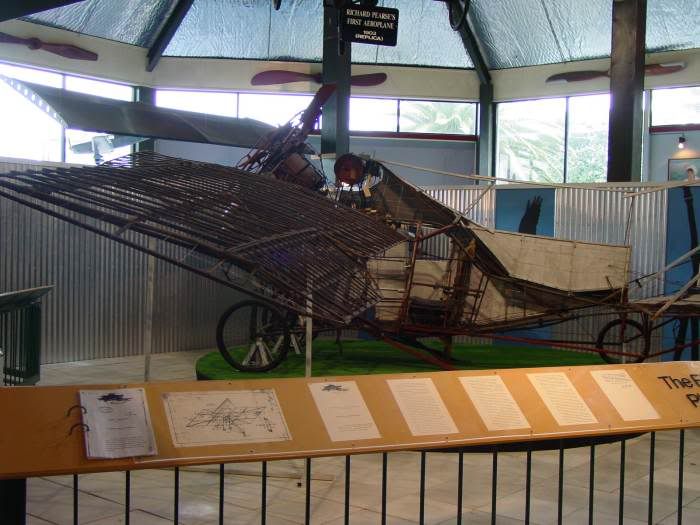The Wright brothers just glided in 1903. They flew in 1908.
Thread Starter
Join Date: May 2014
Location: Alaska
Posts: 175
Likes: 0
Received 0 Likes
on
0 Posts
He (Richard Pearse) made and flew gliders from 1899 onwards, his first powered flight was in early 1903. ... Not everything can be found on the internet, there's still good information that can only be found in books.
see:
1) http://www.pprune.org/aviation-histo...ml#post8515632
2) http://www.pprune.org/aviation-histo...ml#post8514812
3) http://www.pprune.org/aviation-histo...ml#post8514760
You are persisting in maintaining he flew in 1903. I need evidence. I can not simply believe you. What books say Pearse flew in 1903 and based on what evidence?
Anyway, after seeing a few pictures of a plane built by Pearse, I immediately started to suspect he was a schizophrenic. (Schizophrenics with technical abilities build machines looking like a big mess, a combination between logical and illogical things). Reading his biography I found out that he had died in a hospital for mentally ill people after becoming obsessed somebody will still his inventions. Therefore, my initial guess was not far from the truth.



One of the planes built by Richard Pearse
Last edited by simplex1; 11th Jun 2014 at 03:30.
You are persisting in maintaining he flew in 1903. I need evidence. I can not simply believe you. What books say Pearse flew in 1903 and based on what evidence?
As has been said about such things, you are entitled to your own opinions but not your own facts. Use scientific method rather than opinion for research, it'll work a lot better.
Join Date: Nov 2007
Location: New Zealand
Age: 77
Posts: 519
Likes: 0
Received 0 Likes
on
0 Posts
simplex1
I am afraid that such comments do nothing to prove/disprove his flying efforts.
Anyway, after seeing a few pictures of a plane built by Pearse, I immediately started to suspect he was a schizophrenic. (Schizophrenics with technical abilities build machines looking like a big mess, a combination between logical and illogical things). Reading his biography I found out that he had died in a hospital for mentally ill people after becoming obsessed somebody will still his inventions. Therefore, my initial guess was not far from the truth.
Thread Starter
Join Date: May 2014
Location: Alaska
Posts: 175
Likes: 0
Received 0 Likes
on
0 Posts
The book "Wings over Waitohi: the Story of Richard Pearse" by C.G. Rodliffe is written before 1997, in a time when the 1909 articles about Richard Pearse (see my previous post) had not yet been discovered by aviation historians. The book does not take into account the latest information available. It is outdated.
Thread Starter
Join Date: May 2014
Location: Alaska
Posts: 175
Likes: 0
Received 0 Likes
on
0 Posts
I am afraid that such comments do nothing to prove/disprove his flying efforts.
If someone show you a plane, like in the three pictures I have already posted, and says he flew it for 100 meters, do you believe him?
Join Date: Jul 2007
Location: Auckland, NZ
Age: 79
Posts: 721
Likes: 0
Received 0 Likes
on
0 Posts
Use scientific method rather than opinion for research, it'll work a lot better.
The evidence for the Wrights' success in 1903 is not conclusive, if you want to interrogate it suspiciously, but it forms part of a consistent pattern of flights with gliders before that date, and undoubtedly successful flights after that date. OTOH, the claims of Whitehead are too good to be true, especially in the absence of any subsequent history of success. Pearse's dates are contested, which is not surprising, but even if he did fly in 1903, he's not historically very significant, because he's so out of the line of development.
As Pearse said, following Samuel Smiles, the notion of a single inventor is mistaken, and the Wrights' claim to priority is, historically, most significant for its effect on aeronautical development in the USA; but their really isn't much point in replacing them with some other claimant for first successful powered flight, given that the answer is to a large extent predetermined by the definition of "successful".
Good post FP...
Pearse contested the 1903 date himself - and I will repeat again that Pearse never claimed to be first !
I will also repeat (again) that the Wrights never claimed to be first at anything !
A significant difference between (say) the Wrights and (say) Pearse is that the Wrights were experienced engineers who had spent years gradually developing the technology and the expertise to fly a powered aircraft whereas Pearse could perhaps be described as an eccentric inventor !
Please note - I am not knocking Pearse or any other pioneer - they were brave men to fly (or even attempt to fly) those early aircraft !
rgds LR
Pearse's dates are contested, which is not surprising, but even if he did fly in 1903, he's not historically very significant, because he's so out of the line of development.
I will also repeat (again) that the Wrights never claimed to be first at anything !
A significant difference between (say) the Wrights and (say) Pearse is that the Wrights were experienced engineers who had spent years gradually developing the technology and the expertise to fly a powered aircraft whereas Pearse could perhaps be described as an eccentric inventor !
Please note - I am not knocking Pearse or any other pioneer - they were brave men to fly (or even attempt to fly) those early aircraft !
rgds LR
Join Date: Jul 2013
Location: UK
Age: 68
Posts: 736
Likes: 0
Received 0 Likes
on
0 Posts
If we were not currently able to fly, but were on the verge of getting airborne, I have been thinking about what criteria I would use to determine unequivocally which new candidate was the first to fly a controllable and "practical" aeroplane.
Smooth and absolutely level surface
No manual pushing or towing and no mechanical assistance to help acceleration/take off
No headwind to increase lift
Consistent atmospheric conditions
Figure of 8 flight or two oval flights in opposite directions
Furthermore, the altitude above sea level that different candidates use to take off from would also have to be taken into account, perhaps all candidates should demonstrate take off at sea level and at several specified level heights above it
An international panel of experts to monitor, instruments to measure, and cameras to film and photograph each flight.
Only then could we establish which machine really was "practical" and capable of getting into the air and making controlled flight purely by its own power and design/construction.
With due respect to all the claimed first flights, they were not done in consistent/controlled conditions and I do not think that any of them would pass the sort of criteria and monitoring that the modern world expects of record breakers.
Smooth and absolutely level surface
No manual pushing or towing and no mechanical assistance to help acceleration/take off
No headwind to increase lift
Consistent atmospheric conditions
Figure of 8 flight or two oval flights in opposite directions
Furthermore, the altitude above sea level that different candidates use to take off from would also have to be taken into account, perhaps all candidates should demonstrate take off at sea level and at several specified level heights above it
An international panel of experts to monitor, instruments to measure, and cameras to film and photograph each flight.
Only then could we establish which machine really was "practical" and capable of getting into the air and making controlled flight purely by its own power and design/construction.
With due respect to all the claimed first flights, they were not done in consistent/controlled conditions and I do not think that any of them would pass the sort of criteria and monitoring that the modern world expects of record breakers.
Join Date: Nov 2007
Location: New Zealand
Age: 77
Posts: 519
Likes: 0
Received 0 Likes
on
0 Posts
A significant difference between (say) the Wrights and (say) Pearse is that the Wrights were experienced engineers who had spent years gradually developing the technology and the expertise to fly a powered aircraft whereas Pearse could perhaps be described as an eccentric inventor !
Do not denigrate Richard Pearse to make the Wright Bros look good.
Join Date: Jul 2007
Location: Auckland, NZ
Age: 79
Posts: 721
Likes: 0
Received 0 Likes
on
0 Posts
Pearse contested the 1903 date himself - and I will repeat again that Pearse never claimed to be first !
The book "Wings over Waitohi: the Story of Richard Pearse" by C.G. Rodliffe is written before 1997, in a time when the 1909 articles about Richard Pearse (see my previous post) had not yet been discovered by aviation historians. The book does not take into account the latest information available. It is outdated.
Rodliffe personally interviewed the witnesses to the 1903 flights while they were still alive and cross-checked what they said to confirm the dates.
Can you please troll somewhere else.
Does Rodliffe mention Bolt and Gibbs-Smith in his book? Somewhere in the early 60's they must have looked into the case? But that was quite some time ago...
George Bolt - Wikipedia, the free encyclopedia
Charles Harvard Gibbs-Smith - Wikipedia, the free encyclopedia

George Bolt - Wikipedia, the free encyclopedia
Charles Harvard Gibbs-Smith - Wikipedia, the free encyclopedia

Join Date: Jul 2013
Location: UK
Age: 68
Posts: 736
Likes: 0
Received 0 Likes
on
0 Posts
Those Australian drawings look as absurd as many other early planes and concepts, but given a sufficient power to weight ratio all manner of aeronautical atrocities can be made to fly:
https://www.youtube.com/watch?v=0rJnXZsrMjU
If this lawn mower were to be proportionally scaled up in size and power it should be capable ofcarrying a person, albeit one even dafter than myself !
Power to weight ratio was the supreme problem for early flights. People like Cayley had already invented the concept (and even the form) of the aeroplane before any powered flights, and given a sufficiently powerful/light engine his designs probably would have worked.
Once the Internal Combustion engine had been invented (as a result of several significant steps by different people) powered flight was inevitable.
https://www.youtube.com/watch?v=0rJnXZsrMjU
If this lawn mower were to be proportionally scaled up in size and power it should be capable ofcarrying a person, albeit one even dafter than myself !
Power to weight ratio was the supreme problem for early flights. People like Cayley had already invented the concept (and even the form) of the aeroplane before any powered flights, and given a sufficiently powerful/light engine his designs probably would have worked.
Once the Internal Combustion engine had been invented (as a result of several significant steps by different people) powered flight was inevitable.
Power to weight ratio was the supreme problem for early flights. People like Cayley had already invented the concept (and even the form) of the aeroplane before any powered flights, and given a sufficiently powerful/light engine his designs probably would have worked.
Once the Internal Combustion engine had been invented (as a result of several significant steps by different people) powered flight was inevitable.
Once the Internal Combustion engine had been invented (as a result of several significant steps by different people) powered flight was inevitable.
Last edited by Haraka; 11th Jun 2014 at 13:46.
Thread Starter
Join Date: May 2014
Location: Alaska
Posts: 175
Likes: 0
Received 0 Likes
on
0 Posts
Rodliffe personally interviewed the witnesses to the 1903 flights while they were still alive and cross-checked what they said to confirm the dates.
"Stella Randolph's 1937 book "Lost Flights Of Gustave Whitehead" presented what evidence there was that Whitehead flew aboard a powered flying machine in 1899, or 1901, or 1902 (all were claimed as years in which Whitehead flew). It is an interesting book which includes signed affidavits attesting that flights were made and witnessed"
Source: http://www.flyingmachines.org/gwhtd.html
If everything comes down to witnesses then Whitehead has a clear priority over Pearse.
Noting the American word for an aeroplane being "airplane", some might try having some fun on Google.
If you look up something along the lines of "who invented the airplane?" you get all the usual "Wrights", "Whitehead" cap and bells pantomime with sometimes a derisive side reference to somebody like Santos Dumont.
However , if you ask, "who invented the aeroplane?"
something different transpires.......
(This triggered by Orville Wright's modestly titled ( probably partly ghost written) tome " How We Invented the Airplane" )
Once again , I do not disparage the Wrights themselves as engineers or flyers.
If you look up something along the lines of "who invented the airplane?" you get all the usual "Wrights", "Whitehead" cap and bells pantomime with sometimes a derisive side reference to somebody like Santos Dumont.
However , if you ask, "who invented the aeroplane?"
something different transpires.......
(This triggered by Orville Wright's modestly titled ( probably partly ghost written) tome " How We Invented the Airplane" )
Once again , I do not disparage the Wrights themselves as engineers or flyers.
Join Date: May 2014
Location: California
Posts: 12
Likes: 0
Received 0 Likes
on
0 Posts
Who Invented the Airplane? World authority says Whitehead
I find it amazing that Jane's All the World Aircraft (the bible of aviation history) could issue its (accurate) findings that Gustave Whitehead of CT was inventor of the first successful airplane, ergo "first in flight" and this is not acknowledged by this group of commentators. It is well known in Fairfield, CT and the surrounding towns that Gustave Whitehead flew there in 1901 and made many flights from 1901-1910, many of these were witnessed and officially documented. What most people don't understand is that the Wrights rigged their official recognition as pioneer inventors (first) in order to broaden their patent rights. They hired someone to do this for them and it worked well, all documented in letters they and he wrote. Then Orville, whose life passion was to be recognized as first in flight (ahead of his own brother and any others) did accomplish this by many actions taken right through 1948, when a Contract with the Smithsonian was signed to ensure it. The public has been hoodwinked over and over by those who sought to control the title of "first in flight" - the Wrights and later, their friends and the Smithsonian. History has often been controlled by those who wished to gain power and money. This is no different. The Wrights were not first in flight. Whitehead actually was. Gustave Whitehead First to Fly for more information.
No need for the shriek marks. I wasn't claiming that Pearse was the first, just stating a hypothetical. For something that isn't all that important in the history of aviation, it sure raises a lot of excitement.
rgds LR







